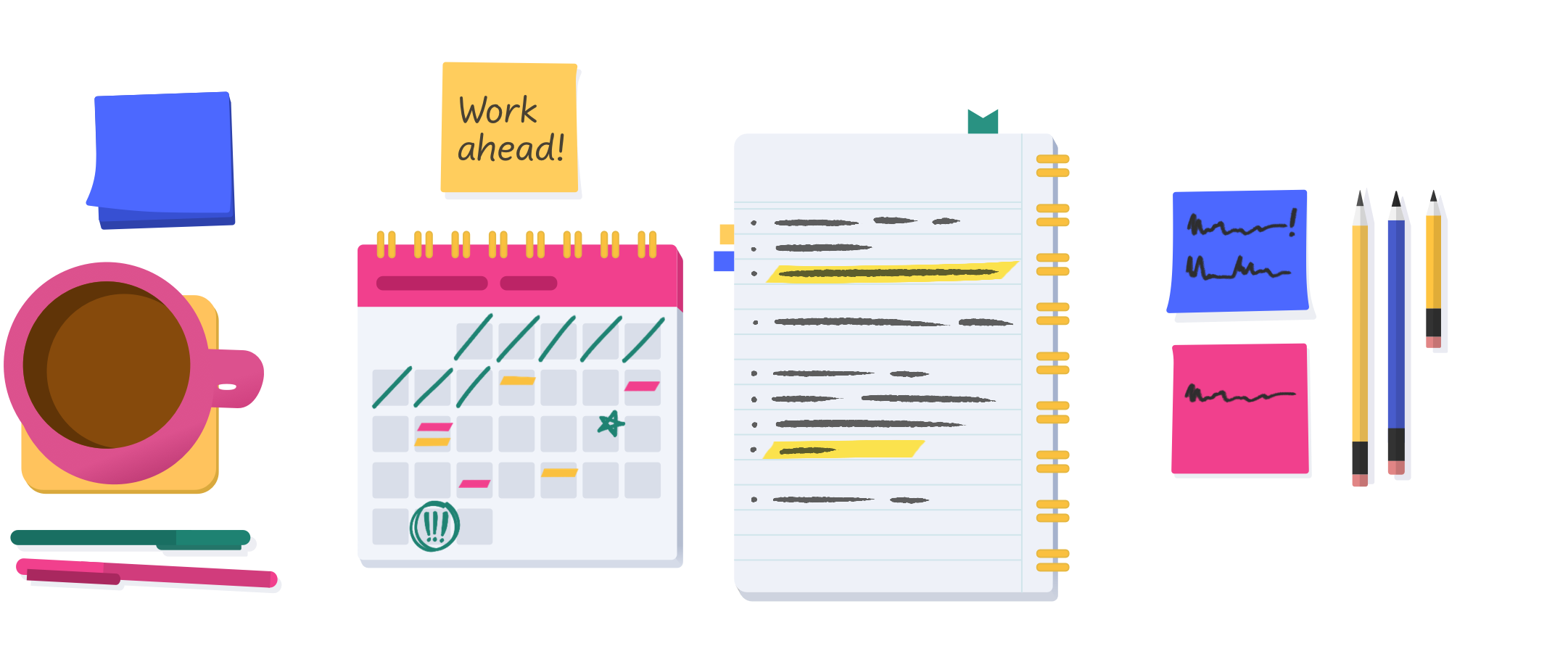How a Little Extra Effort By Your “Current Self” Can Help Your “Future Self”
Effective time management and work prioritization can be two of the biggest obstacles for people. These issues can be caused by a variety of sources, some as a result of business needs and others because of lackluster personal planning.
The Local Wisdom team recently held our monthly roundtable discussion, with members of the group sharing some of their best tips for time management both in and out of the workplace. These ideas got us thinking about how we can all make improvements in our own processes, but also that we should find a way to share our new wisdom with others.
Here, we’ll start with tips on how to get yourself caught up on your existing responsibilities, then we’ll go into techniques for how you can get ahead. Through our recommendations, we hope you’ll find ways to work smarter to improve efficiency and avoid missed deadlines, while still getting all of your work done, and – bonus! – saving yourself some stress.
Getting Caught Up
First, prioritize! If you have a long to-do list, take a few minutes to figure out what is most important.Are there tasks that need to be completed before others can start? If so, take care of those first. This technique can be especially helpful if others on your team are relying on your tasks to be completed before they can start their own. On the flip side, see if there are any tasks that can wait to be completed.
If you’re having trouble deciding which projects to tackle first, see how many of your deadlines are coming from someone else in comparison to those you’ve set for yourself. If you have flexibility in those you’ve self-set, adjust accordingly to give yourself more time to get everything done.
For those tasks and deadlines that you’ve assigned yourself, it can also be helpful to determine if they are a need or a want, then focus on the needs first. You can always tackle the wants when your workload calms down.
Next, realize that everyone works differently. If you’re struggling to meet a deadline on a collaborative project as a result of a colleague not finishing their tasks that yours are contingent upon, have a level-headed conversation with them to provide constructive feedback.
Now it is time to find an organizational method that works for you. Declutter your workspace. Try writing things down in a day planner or even on sticky notes. Keep a to-do list digitally or create a color-coded email calendar based on project or urgency. Also take your workspace(s) into account. If you’re in a hybrid setup with some of your workdays taking place at home and others in the office, does carrying a pile of sticky notes back and forth make sense? For some, it will. For others, they’ll rethink old methods that may no longer be practical for them.
Finally, if you find yourself overwhelmed with everything you need to get done, look for something on your list that will only take 15-20 minutes and get that done. You may find yourself feeling a sense of accomplishment that motivates you to work towards your next task.
In the event you genuinely have more being expected of you than you can handle, be clear in setting boundaries and limits to what is being asked. It is almost always better to be upfront when you know a timeline or expectation is not achievable than it is to wait for the deadline to approach and say the work won’t be done on time. Sometimes it really is alright to do less.
 Working Ahead
Working Ahead
Once you feel that you’ve caught up and are in a good spot, many of us will take our foot off the gas pedal, but that might not be the best move over time. Absolutely let yourself take a “brain break” to regroup after you’ve gotten through a rough stretch at work. But once you feel refreshed, it’s time to think strategically.
Those slow periods are the perfect time to work ahead. If you’re responsible for something that is ongoing or repeats on a monthly, quarterly or even annual basis, you probably have a good idea of what will be needed along the way leading up to the next completion date. If you know a project will be repeated, you can also keep a running daily agenda of what you did every step of the way. This can be an excellent historical document to reference later to plan your day-to-day, see how you tackled issues in prior iterations and confirm you’re on-track to finish ahead of the deadline.
Working ahead like this may not sound like a lot of fun, but it really can be a good thing. Have you ever intentionally left $20 in a coat pocket once spring started and thought, “I’m going to be so excited when I find this again next winter?” You can use that same mindset when it comes to your work. What can your “current self” do to help out your “future self?” If you work on the same recurring project every year during the second quarter and know that the workload will be especially heavy in May, why not take some downtime in April to prepare? Come May, you may have forgotten about that part of the project your “past self” took care of, but you’ll feel relieved when you go to take care of it and find it’s already done.
This same technique can apply just as well in your personal life as it does professionally, and it doesn’t need to be something that’s done over a long period of time. If you’re cooking a complex dinner, clean up as you go. When you’ve popped your meal into the oven, clean any dirty dishes, put away bottles of seasoning or extra unused ingredients and wipe down any surfaces you used while your food is cooking so you’ve got a clean space when your meal is done. Once you’ve eaten, you’ll be so glad the only things you need to worry about cleaning up are the plates and utensils from the dinner table, rather than a messy countertop and a daunting sink full of cutting boards and dirty pans.
Simple and gradual mindset and time-management changes can lead to a much more productive lifestyle, in and out of the workplace.
 Most Important
Most Important
The final step for effectively managing your time actually has nothing to do with the work itself, but could arguably be the most important: take a deep breath and cut yourself and your coworkers some slack!
People are often their own worst critics. If you need to take a break, do so! Something as simple as a 15-minute walk outside can declutter your mind and put your focus back on track.
No matter who you are or what your role is, there are things going on in life beyond work responsibilities. Demands on your time can be overwhelming. Remember that you and your coworkers are people first. Everyone has something outside of work that can impact their “9-5,” whether that’s an unexpected change to afterschool care, taking care of an elderly family member, bringing a pet to the veterinarian, tackling a home maintenance issue or taking care of their own wellbeing.
Showing empathy for yourselves and your coworkers will do wonders for productivity. Creating an environment that allows employees to take a step back when they need to leads to a happier workplace.
Those who feel valued and understood will always perform better than those who do not.





